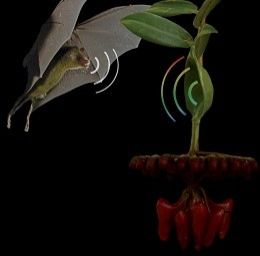Cuban Vine Uses Unique Acoustic Leaves to Attract Pollinating Bats

Marcgravia evenia, a vine in the rain forests of southeastern Cuba, uses a unique method to pollinate - instead of using striking colors or beautiful scent as most pollinating plants do, it uses its dish-shaped leaves to bounce back sound made by pollinating bats, helping the nocturnal creatures find them easily.
Marcgravia evenia uses dish-shaped deep-bowled leaves located right on top of the flowers to reflect the sound made by bats and help the creatures find them easily, a research paper published in journal Science said.
The unique acoustic signature echoes produced by the satellite dish antenna-shaped leaves of the vines are easily indentified by the bats and help them maneuver through the forest and locate the plants.
Lead author Ralph Simon, a biologist at the University of Ulm in Germany, and his colleagues Marc W. Holderied, Corinna U. Koch and Otto von Helversen, tested how effective the leaves were in helping the bats reach the vines quickly.
The researchers arranged a room with fake foliage to mimic a rain forest environment, hid a plastic feeder filled with sugar water among them and released captive bats in the room.
When the feeder stood alone, the bats took 23.2 seconds to locate it and when it was attached to a replica of a normal-shaped vine leaf, the bats took 22 seconds to find it.
However, when the feeder was attached to a replica of Marcgravia evenia, the bats took only half the time or 12.3 seconds to locate it.
The research shows the effectiveness of the unique leaves of the vine in helping the pollinating bats home in on the target very quickly, while nearly instantaneously taking account of and dismissing other objects in their path. "They have a very special kind of echo," Simon said. "This echo is very loud and has a constant signature from different angles."
The symbiotic relationship between the bats and plants is significant because the bats visit hundreds of flowers in just one night to meet their nectar needs and in return help the vines to pollinate and spread its seeds.
"For the plants, it increases the success of pollination," Simon said. "For the bats, it's good because it helps them find the flowers faster — they have to make several hundred visits to flowers every night."
"Bats are very efficient pollinators, and they have large home ranges," the researcher continued. "(The vine) is a rare species with a patchy distribution pattern. These bats are extremely helpful, because they can exchange pollen between plants that grow far apart."
The study, titled 'Floral acoustics: conspicuous echoes of a dish-shaped leaf attract bat pollinators,' appears to be one of the first to investigate the evolution of echo-acoustic signals in plants.
© Copyright IBTimes 2025. All rights reserved.





















